ENCYCLOPEDIA P
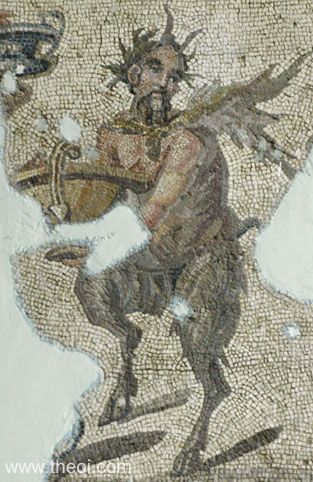
PAEON (Paion) The physician of the gods.
PAIDIA The goddess of play and amusement. She was an attendant of the goddess Aphrodite. 
PALAEMON (Palaimon) A young dolphin-riding sea-god who came to the aid of sailors in dsitress. He was a son of the princess Ino who was transformed into a godling when his mother leapt with him into the sea. 
PALICI (Palikoi) The gods of Sicilian geysers and thermal springs. They were also protectors of runaway slaves and defenders of the sacred oaths sworn on their waters.
PALIOXIS The male personification of backrush, one the spirits of the battlefield.
PALLAS (1) TheTitan-god of warcraft. He was the father of Victory, Force, Power and Rivalry.
PALLAS (2) A goatish Gigante slain by Athena who flayed his skin for a shield.
PALLAS (3) A nymph companion of the goddess Athena. She was accidentally killed during their war-games, and in her memory the goddess crafted the Palladium.
PAN The Arcadian god of shepherds and goatherds. He had the legs, horns and tail of a goat. 
PANACEA (Panakeia) The goddess of cures. She was a daughter of the medicine-god Asclepius.
PANDAISIA The goddess of rich banquets. an attendant of the goddess Aphrodite.
PANDIA (Pandeia) A goddess daughter of Zeus and the moon-goddess Selene.
PANDORA The first woman created by the gods who opened the lid of a magic jar containing all the evils which plague mankind. 
PANES Rustic daemones with the legs and horns of a goat. They were similar to the god Pan but more goatish in face and form. 
PANNYCHIS (Pannykhis) The goddess of night-time parties and festivities. She was an attendant of Aphrodite.
PANOPIA (Panopeia) The Nereid-goddess of panorama--the sighting of land and approaching storms at sea.
PAREGOROS The personification of soothing words, an attendant of the goddess Aphrodite.
PAREIA A nymph of the island of Paros loved by King Minos of Crete.
PARTHENOS A virgin goddess. She was a Naxian princess who leapt into the sea to escape the wrath of her stepfather Staphylus. Her true father Apollo then transformed her into a goddess.
PASIPHAE A goddess-witch of the island of Crete and wife of King Minos. She was cursed with an unnatural lust for the Cretan Bull and after mating it conceived the bull-headed Minotaur. 
PASITHEA One of the Charites who was the wife of Hypnus, god of sleep.
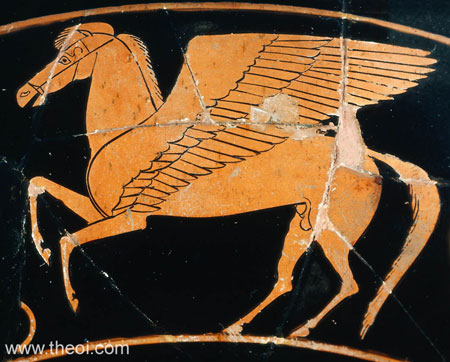
PASSALUS (Passalos) One of the monkey-like Cercopes.
PEGAEAE (Pegaiai) Naiad-nymphs of springs.
PEGASIS A Trojan Naiad-nymph.
PEGASUS (Pegasos) A winged horse which sprang from the neck-stump of the decapitated Gorgon Medusa. He was tamed by the hero Bellerophon who rode him into battle against the Amazons and the monstrous Chimera. 
PEIRENE The Naiad-nymph of a fountain of the town of Corinth loved by the god Poseidon.
PEITHO The Oceanid-goddess of persuasion and seductive words. She was the nurse and a close companion of the goddess Aphrodite. 
PELIONIDES The nymphs of Mount Pelion, daughters of the centaur Chiron. They nursed the Centaurs spawned on the mountain by the cloud-nymph Nephele.
PEMPHREDO One of the ancient Graea-hags
PENELOPE (Penelopeia) An Arcadian Oread-nymph. She was the mother of the god Pan by Hermes.
PENEUS (Peneios) The chief river of Thessaly and its god.
PENIA The female personification of poverty who seduced the god Porus (Expediency) during the birthday celebrations of the goddess Aphrodite.
PENTHUS (Penthos) The male personification of grief and lamentation.
PERIBOEA (1) (Periboia) The Oceanid-nymph wife of the Titan Lelantus.
PERIBOEA (2) (Periboia) The Naiad-nymph wife of the Spartan prince Icarius.
PERSEIS An Oceanid-nymph loved by the sun-god Helius. She was the mother of the witches Circe, Pasiphae and Aeetes.
PERSEPHONE The queen of the underworld. She was a spring-time goddess abducted to the land of the dead by Hades. Her mother Demeter brought famine to the world until Zeus agreed to let her return for part of the year. 
PERSES The Titan-god of destruction, father of the witch Hecate.
PERSEUS A great Argive hero who slew the Gorgon Medusa and rescued the princess Andromeda from a sea-monster. 
PEUCE (Peuke) The Naiad-nymph of an isle of the river Ister (the Danube).
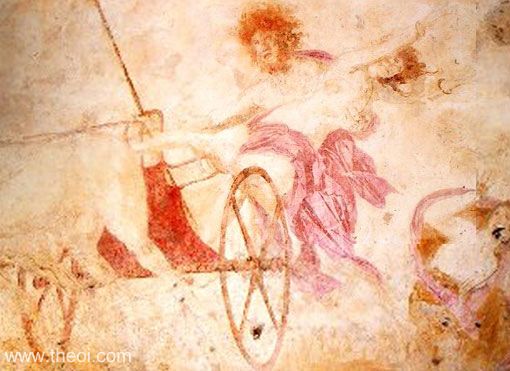
PHAEA (Phaia) A wild sow which ravaged the town of Crommyon. It was slain by the hero Theseus. 
PHAENON (Phainos) The god of the star Jupiter or Saturn. He was a beautiful youth crafted by the Titan Prometheus. Zeus fell in love with him and made him a shining star-god.
PHAEO (Phaio) A starry Hyad-nymph.
PHAESYLE (Phaisyie) One of the starry Hyades.
PHAETHON (1) A son of the god Helius who lost control of his father's sun-chariot and set the earth ablaze. Zeus struck him down with a lightning bolt.
PHAETHON (2) The handsome, young god of the star of the planet Jupiter. He was seized by Aphrodite who appointed him as guardian of her Syrian temple.
PHAETHUSA (Paethousa) A nymph daughter of the sun-god Helios who tended his flocks on the island of Thrinacia.
PHALES The god of the phallus and the phallic icon of the fertility processions of the god Dionysus.
PHANES The golden-winged god of creation who hatched from the cosmic egg at the dawn of time.
PHARMACEA (Pharmakeia) The Naiad-nymph of a poisonous spring near the city of Athens.
PHASIS A river of Colchis and its god.
PHAUNUS (Phaunos) The god of forests, one of the companions Dionysus. He was the same as the Italian Faunus.
PHEME The female personification of rumour.
PHERES LAMIOI Demigod guardians and companions of the infant god Dionysus. They were transformed into bull-horned beasts by the enraged goddess Hera.
PHERESPONDOS One of the three Satyr messengers of the god Dionysus.
PHERUSA (Pherousa) The goddess of plenty and abundance. She was one of the Horae (Seasons).
PHIALE One of the attendant nymphs of the goddess Artemis.
PHIGALIA A Dryad-nymph of the Arcadian town Phigalia.
PHILODICE (Philodike) A Naiad-nymph daughter of the river Inachus who was the wife of an early Messenian king.
PHILOPHROSYNE The goddess of friendliness and welcome. She was one of the Charis daughters of the god Hephaestus.
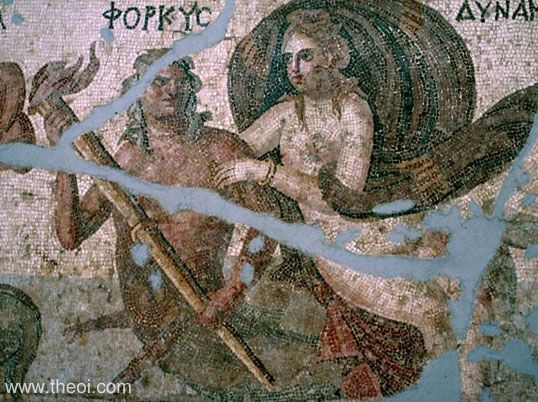
PHILOTES The female personification of affection, friendship and perhaps also sex.
PHILYRA (Philyre) An Oceanid-nymph loved by the Titan Cronus. When Rhea interrupted their tryst he transformed himself into a stallion and from their union was born the two-formed centaur Chiron. Philyra was afterwards transformed into a linden tree.
PHOBUS (Phobos) The daemon personification of fear. He was a son and battlefield companion of the god Ares. 
PHOEBE (1) (Phoibe) The Titan-goddess of the bright intellect who presided over the oracle of Delphi. She gifted the shrine to her grandson Apollon on his birthday.
PHOEBE (2) One of the Leucippides, Messenian princesses who became the goddess-wives of the Dioscuri twins. 
PHOEBE (3) (Phoibe) A Hamadryad-nymph loved by King Danaus of Libya.
PHOENIX (Phoinix) A fabulous Arabian or Indian bird whose egg was hatched in flames.
PHOETIUS (Phoitos) A Gigante vanquished by the goddess Hera in the giant war.
PHOLUS (Pholos) An Arcadian centaur who entertained Heracles in his cave with wine. When the other centaurs attacked Heracles drove them off with volleys of poisoned arrows. Pholus afterwards picked up a fallen arrow, accidentally dropped it on his foot and died. 
PHONOI The personifications of murder.
PHORCYS (Phorkys) An ancient sea-god representing the hidden dangers of the sea. He was the father or grandfather of many of the monsters of myth. 
PHTHONUS (Phthonos) The personification of jealousy and envy.
PHUSIS The primordial goddess of nature.
PHYLONOE A Spartan maiden made immortal by the goddess Artemis.
PISTIS The female personification of trust, honesty and good faith.
PITANE A Naiad-nymph daughter of the Spartan river Eurotas loved by the god Poseidon.
PITYS A Dryad-nymph who fled the embraces of Pan and was transformed into a fir-tree.
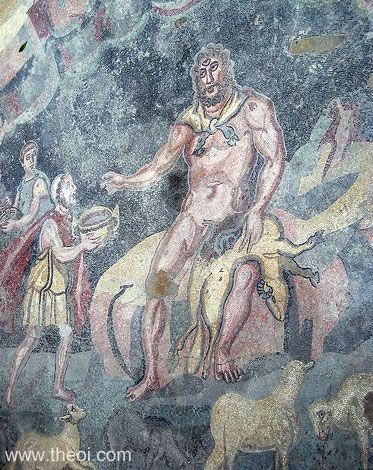
PLATAEA (Plataia) The Naiad-nymph eponym of the Boeotian town of Plataea. She was loved by the god Zeus who once pretended to take her for his bride when Hera abandoned their marriage.
PLEIADES Seven star-nymph daughters of the Titan Atlas loved by the gods. They were transferred to heavens after the lusty giant Orion chased them across the earth for seven years.
PLEIONE The Oceanid-nymph wife of the Titan Atlas. She and her seven Pleiad-daughters were pursued by the lusty giant Orion for seven years.
PLEISTUS (Pleistos) A river of Phocis and its god.
PLUTO (Plouto) The nymph mother of the Lydian King Tantalus by Zeus.
PLUTUS (Ploutos) The god of agricultural wealth. He was blinded by Zeus so that he would distribute wealth indiscriminately and without favour for the good. 
POENA (1) (Poine)The female personification of retaliation.
POENA (2) (Poine) A monstrous, child-devouring she-dragon which was summoned from the underworld by Apollo to punish the Argives for their complicity in the death of his infant son Linos.
POLEMUS (Polemos) The personification of war.
POLYBOEA (Polyboia) A Spartan maiden granted immortality by the goddess Artemis.
POLYBOTES A Gigante crushed beneath the island of Nisyrus by Poseidon in the Giant-War. 
POLYMNIA (Polyhymnia) The goddess-Muse of hymns. 
POLYPHE The Oceanid-nymph mother of the goddess Athena Hippia by Poseidon.
POLYPHEMUS (Polyphemos) A man-eating Cyclops blinded by the hero Odysseus. 
POLYXO An Egyptian Naiad-nymph.
POMPE The female personification of religious processions. 
PONTUS (Pontos) The primordial god of the sea who was the father of the ancient sea-gods by Gaea (Earth) and of the fish by Thalassa (Sea). 
PONUS (Ponos) The personification of hard labour and toil.
PORPHYRION The king of the Gigantes who waged war on the gods. He was slain by Zeus and Heracles during the war as he attempted the rape of the goddess Hera. 
PORUS (Poros) The male personification of expediency. He was seduced by Penia (Poverty) at the birthday celebrations of Aphrodite.
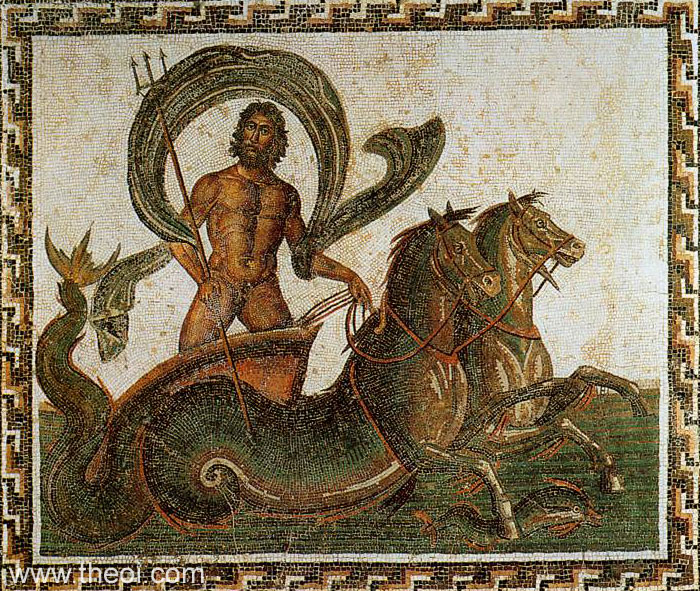
POSEIDON The king of the sea, and god of horses, rivers and earthquakes. He was one of the twelve Olympian gods who received the sea as his domain when the three sons of Cronus drew lots for the division of the cosmos after the fall of the Titans. 
POTAMEIDES Naiad-nymphs of rivers.
POTAMOI The river-god sons of Oceanus and Tethys. They were mutiformed deities--some had the shape of man-headed bulls, others were merman-like creatures with the upper bodies of men and the serpentine tails of fish. 
POTHUS (Pothos) The god of sexual longing. He was one of the winged Erotes (Love-Gods). 
PRAXIDICAE (Praxidikai) The goddess exacters of justice.
PRAXIDICE (Praxidike) The goddess exacter of justice.
PRAXITHEA The Naiad-nymph wife of King Erechtheus of Athens.
PRIAPUS (Priapos) The rustic god of garden fertility. He was an ugly satry-like creature with oversized genitals. 
PROIOXIS The battlefield personification of onrush.
PROMETHEUS The Titan-god of forethought who was tasked with the creation of mankind. He cheated the gods on several occasions including the theft of fire. As punishment Zeus chained him to Mount Caucasus and set an eagle to feed on his ever-regenerating liver. He later freed from his torments by Heracles. 
PRONOEA (Pronoia) The Oceanid-goddess of foresight, wife of the Titan Prometheus.
PRONOMUS (Pronomos) One of the three Satyr messengers of the god Dionysus.
PROPHASIS The female personification of excuse, daughter of the Titan Epimetheus (Afterthought).
PROSYMNA A Naiad-nymph daughter of the river Asterion. She and her sisters Euboea and Acraea were nurses of the infant goddess Hera.
PROTEUS An old sea-god who herded the seals of Poseidon. He was once captured by the hero Menelaus who held him fast and forced him to prophesy.
PROTOGENOI The first-born, primordial gods which formed the very fabric of the cosmos--Chaos (Air), Gaea (Earth), Tartarus (The Pit Below), Uranus (Sky), Pontus (Sea), Nyx (Night), Erebus (Darkness), Hemera (Day), and Aether (Light). Each had the form of his or her own element, though a few were known to appear in anthropomorphic form.
PSALACANTHA (Psalakantha) An Icarian nymph who fell in love with the god Dionysus. When she attempted to dissuade Ariadne from marrying the god, he angrily transformed her into a plany-plant.
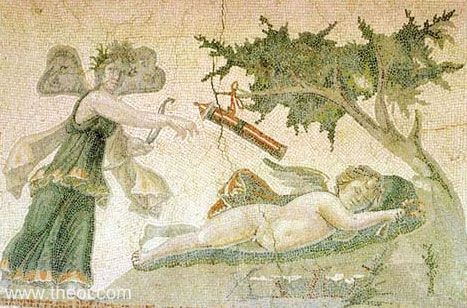
PSAMATHE The Nereid-goddess of sand who was seduced by King Aeacus of Aegina. 
PSECAS (Psekas) One of the attendant nymphs of the goddess Artemis.
PSEUDOLOGOI The male personifications of lies.
PSYCHE (Psykhe) The goddess of the soul, wife of the love-god Eros (Cupid). She was originally a mortal princess who rivalled Aphrodite in beauty. When Eros fell in love with her the goddess put her through many trials before accepting her into the Olympian fold. 
PTELEA The Hamadryad-nymph of the elm tree.
PTOCHEIA (Ptokheia) The female personification of beggary.
PYGMIES (Pygmaioi) A tribe of two-foot tall men of the far south who waged war on the migrating flocks of cranes. 
PYRIPHLEGETHON The underworld river of fire and its god.
PYRRHICHUS (Pyrrhikhos) The Curete-god of the pyrrhichus dance.
PYROEIS The star-god of the planet Mars.
PYTHON A giant serpent born of the sludge of the earth which was set by Themis or Gaea to guard the oracle of Delphi. Apollo slew the beast with arrows when he claimed the shrine. 